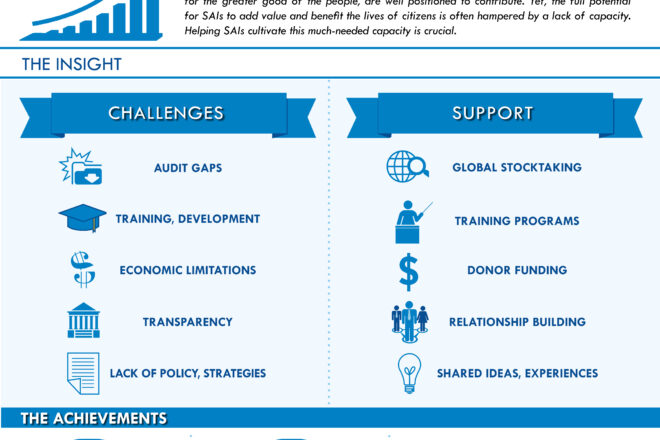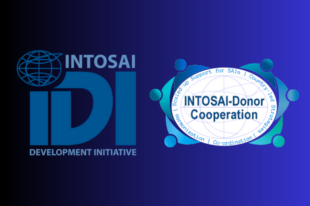The Cooperation’s Work to Unite Donors, SAIs Leads to Success

SAIS OF KIRIBATI AND TUVALU CLOSE ACCOUNTABILITY GAP WITH REGIONAL COLLABORATION
Several smaller island nations in the Pacific, including the SAIs of Kiribati and Tuvalu, have limited auditing capabilities. As of 2009, both SAIs were not completing timely audits. They had hefty audit backlogs and struggled to keep up with changes to international financial reporting standards.
The lack of human resources was a primary challenge. The untimely audit of the government’s accounts entailed reduced accountability for the use of public funds in Kiribati and Tuvalu, as the Parliaments and the citizens did not receive assurance that funds were spent as intended.
The Pacific Association of Supreme Audit Institutions (PASAI), an INTOSAI regional organization, designed a Sub-regional Audit Support Program (SAS) specifically to help some of the smaller, and most vulnerable, SAIs that were facing similar challenges with staff capabilities, audit methodologies and systems. The program was linked to PASAI’s strategic plan and its work program, the Pacific Regional Audit Initiative (PRAI).
The SAS program, operational from 2009 to 2016, supporting SAI capacity building in Kiribati and Tuvalu by helping them complete financial audits, train SAI personnel and improve information sharing. This effort was made possible by a team of secondees from each participating country and supported by consultants who, using updated auditing standards, assisted in auditing public accounts.
The Asian Development Bank, through the Japan Fund for Poverty Reduction, financed the SAS program. Additionally, the Australian Department of Foreign Affairs and Trade and the New Zealand Ministry of Foreign Affairs and Trade have been the primary funders of the PASAI Secretariat, which has helped implement the program.
Through the SAS program, staff competency, confidence and experience have significantly increased.
SAI Kiribati is now up-to-date with the whole of government audits, and Tuvalu’s SAI has audited all financial statements submitted, including the whole of government financial statement for 2015.
The timely completion of the whole of government audits has positively contributed to the availability of current and reliable financial information for the respective governments in preparing budgets and in formulating relevant policies, which will benefit citizens.
The results in PASAI were possible with donor backing aligned behind PRAI and PASAI’s strategic plan, leading to well-coordinated support to all SAIs in the region.
PASAI’s regional approach to capacity development has enabled scarce resources to be utilized in an effective way, as synergies have been realized and peer SAIs have worked together to improve performance at the country level. The approach included staff training and development, sharing resources regionally, and aligning policies to strengthen national capacities.
On the basis of the same regional approach, the INTOSAI-Donor and PASAI secretariats have designed a program for measuring performance directly connected with PASAI’s regional priorities. Financed by the Australian Department of Foreign Affairs and Trade, this newly developed initiative facilitates SAI Performance Measurement Framework (SAI PMF) assessments for numerous smaller SAIs throughout the Pacific region. Using a combination of self-assessments and peer reviews, the goal is to effectively address the challenges associated with staff and skill limitations.
Ms. Matereta Raiman, Kiribati’s Auditor General, noted, “During the course of the SAS program, the staff were able to pass on skills to other staff.”





